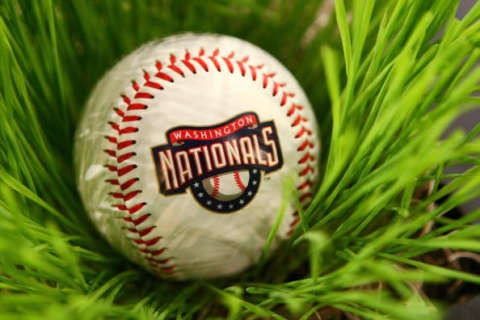The average Washingtonian may not know the name Jeff Smulyan. But Smulyan, a CEO and entrepreneur, almost owned the Washington Nationals, and in his new book he shares his experiences as a team owner and media innovator.
Back in the early 2000s, his group of investors were seen as a shoo-in to buy the baseball team, formerly the Montreal Expos, and bring them to the District. Even though he lived in Indianapolis, he pledged to leave the team in D.C. and commute back and forth to run it.
Smulyan had run a baseball team from afar before — he owned the Seattle Mariners in the ’90s.
I first met Smulyan, who founded Emmis Communications in 1986, the same year the company was recognized as the largest privately-held media group in the United States. I was a student at Indiana University and wanted to include him in a paper I was writing for a communications class.
I called his office and asked for an hour of his time. A few days later, I was checking messages on my answering machine and one was from Smulyan. He said something along the lines of, “Glad to do the interview. Come to my office in Indianapolis, I’ll try to give you an hour.”
I got the hour.
He went on to have a career of 40+ years, successfully buying, selling, owning and running radio stations, TV stations, sports franchises and more. I went on to finish college and land at WTOP — which is, may I say, one of the best radio stations in America and consistently the top billing radio station in the country.
So I’d say we both turned out alright.
The title of Smulyan’s new book, “Never Ride a Roller Coaster Upside Down,” tells the story of his long and continuing career. A title like that begs the question: What were some of the highest moments and lowest valleys?
In a lengthy interview with WTOP, Smulyan says one of the lows was when the radio industry collapsed in 2009. “Our cash flow dropped by like 65% in a two-year period.”
Smulyan said he watched many friends in the industry go bankrupt.
“We didn’t [go bankrupt]. We survived and the book talks about how we did it, and to live to fight another day.”
The lowest of low points for Smulyan was in Seattle when he was the majority owner of the Mariners from 1989 to 1992. The team never made the playoffs during his tenure as owner, and he sold the team in the middle of the 1992 season, which saw the Mariners win a mere 64 games.
Smulyan said the local media ripped into his performance as owner, and the team was not making money because the Mariners were not as big of a draw as the city’s NFL and NBA teams.
“To own the Mariners at that time, you needed to be a billionaire. We weren’t,” he said. “When we put the team up for sale, I was public enemy No. 1 in Seattle.”
He said, in retrospect, his ownership then is being given credit now for revitalizing the team and how it’s currently doing, and he’s proud of that. The Mariners won 90 games in 2022 and made it to the playoffs, ending what was the longest active postseason drought in Major League Baseball.
On the other end of the spectrum, one of his highs is inventing something new in radio — the all-sports radio format.
Smulyan said he was daydreaming in a media class during his time at the University of Southern California when came up with the idea for all-sports radio. He said Emmis Communications has always been collaborative, so years later when the company bought its first AM radio station in New York City, he brought the idea forward to his managers of making it all sports.
“It got voted down.”
But he said there was a change of heart, sort of.
He said the managers came back and said, “We still think it’s a stupid idea, but we’re really doing well everywhere else and we owe you one, so we’ll do this.”
That was the birth of all-sports radio, which Smulyan said didn’t do well in the beginning, but when it turned around, “I went from idiot to genius.”
There’s even an annual sports radio award named the Jeff Smulyan Award. Smulyan has always had a deep interest in sports and was part of an investors group that was in the running to buy the Montreal Expos and relocate them to Washington, D.C., where they became the Nationals.
In the book, he said the biggest battle was getting past the fact that he was from out of town. He was even called a “carpetbagger.”
He told the story of going on the George Michael Sports Machine show, which originated from the studios of NBC Washington but was televised nationwide:
“The interview went well, and I turned on the news that night to see how it came out. After the interview, George turned back to Jim Vance, the longtime anchorman for Channel 4, and I was stunned to hear Vance announce, ‘That guy’s a carpetbagger, we don’t need him owning our baseball team!’ Michael sheepishly smiled and Vance was on to other news. Now, I’ve certainly been panned in newspapers and have endured some tough interviews, but to see the anchorman attack you on the eleven o’clock news was a painful rarity.”
Despite having a lot of D.C. insiders as part of his group of investors making a bid for the team, including Alfred Liggins, CEO of Radio One, the nation’s largest Black-owned media company; Attorney Dick Wiley, founder of a leading D.C. law firm and a former FCC Chairman; former Washington Commander’s player Art Monk; and Eric Holder, who later became Attorney General during the Obama Administration, the Smulyan group lost out to the Lerner family, who still owns the team.
Smulyan quipped that many people wanted him to get the team to contrast Dan Snyder, owner of the Washington Commanders. In the book, Smulyan recalled this story:
“As one friend in baseball told me: ‘We think you will be the perfect antithesis of Dan Snyder [the owner of the then Washington Redskins], and that’s exactly what we need.’ Now as you read this book, you’ll probably conclude that statement was correct. Snyder is smart and rich; I’m dumb and poor; we are indeed polar opposites. Nevertheless, Snyder’s tenure has been marked by controversy since the day he bought the team (now known as the Washington Commanders). His mercurial personality has been a lightning rod for criticism throughout the region. One newspaper headline summarized the situation: ‘You think your team owner is bad. Dan Snyder is worse.’ The Snyder years in D.C. have been marked by bad performance on the field, controversies everywhere, and fans who now come to the game with signs that say, ‘Sell the team.’ Clearly, people thought our style would be a great contrast to Snyder and I certainly agreed.”
This was not the only brush Smulyan had with Major League Baseball and the Expos. He said in the late ’80s he was approached about possibly moving the Expos to Indianapolis.
“We had looked at it and decided the Indianapolis market wouldn’t work,” Smulyan said, adding the Indianapolis market is not big enough to support three professional sports teams. “We’re very lucky to have the Colts and the Pacers here … the market is not big enough.”
Smulyan concluded the chapter about the Nationals saying, “Do I believe we would have been more innovative and had more impact on the lives of kids in D.C.? You bet I do.”







